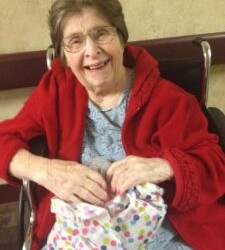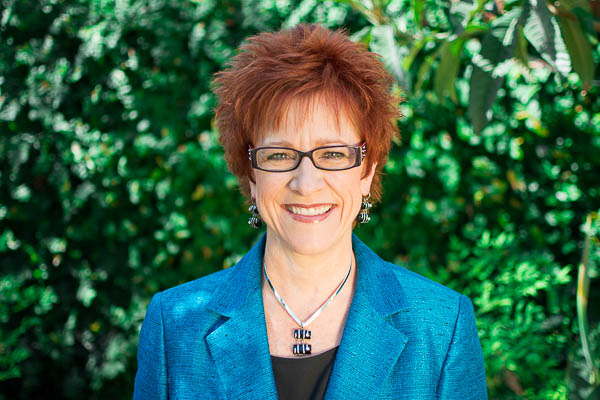by Diane Masson | Oct 26, 2014
My mom is going to be 92 years young on Tuesday and she has had vascular dementia for around 11 years. She can’t remember what she had for breakfast, but she still knows my name. Last week when my husband and I went to see her at the Freedom Village Health Care Center she said, “What a surprise, I am happy to see you!” I was so astonished with her welcome. Usually it can take several minutes for her brain to adjust that we are there. We celebrated her birthday month that evening with a snack, gift and watching a movie together. She was 70% cognitively with us and shared some childhood memories. This week, I was not so lucky. I arrived in the morning with a balloon and a gift from my brother. When I saw her, she was in an anxious mood. I braced myself for an unknown emotional roller coaster. The balloon scared her at first, which shocked me. Then she wanted to read it and soon she was laughing. She told me that it was not a good day, that she could not remember anything and it was all so confusing. I told her that I understood and that it would be okay. She calmed down and then asked what was in the package. I told her it was her birthday gift from my brother Paul. “Is it my birthday?” she asked. I laughed and showed her the sign that I had attached to the balloon. It said, Margie’s birthday is October 28th, she will be 92 years young. I set the balloon next to...
by Diane Masson | Oct 19, 2014
Potentially a senior can save significant money by hiring a companion recommended from church or their neighbor’s friend who has been out of work. It’s a win/win for everybody – right? Wrong! What is their recourse if this win/win situation starts going badly? There is no boss or company where they can voice concerns. Last week, I attended the Care Revolution Conference in Anaheim, CA and met over 20 home care company owners and managers. One manager shared that the majority of her potential caregiver applicants do not pass the drug screening. I was shocked. Another home care owner shared that 40% of the remaining applicants don’t pass the criminal background check. Reputable agencies have a vetting process so a senior can have confidence about who is in their home providing care. Home care owners shared with me that seniors who hire a caregiver “under the table,” become employers and are responsible for taxes and social security of their employee. Seniors should check with their accountant and consider the ramifications of paying quarterly taxes for an employee. Initially, it may sound like a bargain to pay a caregiver “under the table.” Seniors need to consider the long-term financial consequences and legalities. It seems crazy to me that a senior needing help would become an employer and have to pay quarterly taxes. If a caregiver claims a work injury while working for a senior, costs can climb upwards to $300,000 after surgery, therapies and loss time from work. Some caregivers work for multiple companies, so one never really knows if the injury was from working for the senior or another...
by Diane Masson | Oct 12, 2014
Does every assisted living and skilled nursing community in America serve a dessert to their residents for lunch AND dinner? Is this too much sugar? Can sugar cause or increase dementia and Alzheimer’s? My mom lived in assisted living for 7 years and had desserts twice a day. Now, she has lived in skilled nursing for 17 months with desserts twice a day and don’t forget the occasionally ice cream snack or the birthday party with cake. She has progressed over nine years from some memory loss to full blown vascular dementia. Was it life, genes or could sugar have helped it along? What is your opinion? Fact: It is very hard for me to walk away from a good piece of chocolate. I am a sugar addict. Then I started reading about sugar causing inflammation in the body according Dr.Daniel Amen and how sugar can lead to dementia according to New York Times’ best selling author David Perlmutter, MD. When I started eating more that 12 pieces a day, I decided to give up sugar. Every month, I am a presenter at four or more marketing luncheons for prospective residents. The lunches are outstanding and always end with a spectacular dessert. This week it was a cheesecake with strawberry sauce. I said no thank you. As the excellent servers are glancing around and notice that I don’t have a dessert, they come over to offer me one again. Sometimes I have had to say no to dessert three times at one luncheon. It is tough to give up sugar! Temptation is everywhere! There is always a birthday celebration with...
by Diane Masson | Oct 5, 2014
Today, I want to share an inspirational poem that I have read continually since my college days: You Can Be Whatever You Want To Be There is inside you all the potential to be whatever you want to be ~ all of the energy to do whatever you want to do. Imagine yourself as you would like to be, doing what you want to do, and each day, take one step towards your dream. And though at times it may seem too difficult to continue, hold on to your dream. One morning you will awake to find that you are the person you dreamed of ~ doing what you wanted to do ~ simply because you had the courage to believe in your potential and to hold on to your dream. ~ Donna Levine I hope this poem inspires you! You have the capabilities inside you to change the world in our wonderful profession. I am thankful that I help seniors every single day. Tip: Read it out loud, it goes into your subconscious brain faster. Diane Twohy Masson is the author of “Senior Housing Marketing – How to Increase Your Occupancy and Stay Full,” available at Amazon.com with a 5-star rating. The book is required reading at George Mason University as a part of its marketing curriculum. Within this book, the author developed a sales & marketing method with 12 keys to help senior living providers increase their occupancy. Masson developed this expertise as a marketing consultant, sought-after blogger for senior housing and a regional marketing director of continuing care retirement communities in several markets. She has also been a corporate director...
by Diane Masson | Sep 28, 2014
Are you hearing about more and more seniors who are either vegetarians or need a gluten-free diet? How are your chefs and dining directors accommodating these new dietary restrictions at your senior living communities? Do these diet-restricted seniors have more than one choice for lunch and dinner at your retirement community? Or are they stuck with the salad of the day or a vegetable plate? Let’s hear what is happening in our senior living industry on a nationwide basis. Join the conversation at the bottom of this blog. Younger seniors want choices. My Continuing Care Retirement Communities offer 14 entrees, which include vegetarian and gluten-free options. The culinary and serving teams have been trained to accommodate five gluten-free residents at one community. There can be no mishap because a gluten-free senior can get deathly ill if even a crumb of gluten is on their portion of food. Soups that used to be made with a flour-based rue have been replaced with gluten-free options. A gluten-free pasta dish is always one of the 14 entrees. New gluten-free rolls and deserts are available now. What are you doing to accommodate seniors with dietary restrictions? Have you had to expand beyond the standard three entrees a night? Please share what dietary changes you have made at your senior living community. Photo credit: Living Gluten-Free for Dummies Diane Twohy Masson writes this weekly blog to support and engage with other senior housing professionals. Her first book is Senior Housing Marketing – How To Increase Your Occupancy and Stay Full. Many sales teams and organizations have used the 12 keys contained in this book for...
by Diane Masson | Sep 21, 2014
What is your senior living sales style? Are you firing off information about your retirement community like a machine gun or do you have a softer interactive approach with future residents? How a machine gun senior living sales person thinks: It’s very important to give the prospect ALL the information about my community so they can make a good decision. I want to help them move in soon. I give a great and interesting tour of the community. I want to highlight our most popular areas in the community. I want them to try our food and then they will move in. Prospects are busy, so I have to talk fast and get all the key information out. I don’t know why I am not getting more sales, I ask everyone for a deposit. How an interactive senior living sales person thinks: What is the reason they walked in the door of my community today? I am genuinely interested in the customer. What’s most important for them to know? How can I help them? Through listening, I can customize the tour for them. I’ll highlight the parts of the community that the prospect will utilize. Asking questions to learn how my community can solve their problem is important (Are they lonely, have a lack of nutrition, fear of not being found laying on the floor after a fall, home maintenance too much or have a desire for socialization?). Once they start visualizing themselves living in the community, they will make a deposit. What is the one word difference between these two approaches? Listening! Both types of senior living sales...
by Diane Masson | Sep 7, 2014
Have you begun to wonder what happened to quality customer service? I have been through some bad experiences lately and then suddenly I had a “Wow” customer experience yesterday. In the last week, I had two shopping returns. One was an item I purchased on Amazon.com. It has taken eight emails back and forth with the seller and ultimately I felt penalized. I received a product that did not fit and was not as pictured on Amazon. They claimed I ordered the wrong one. Sigh… My second return was an Origami Owl locket. Two of the crystals had fallen out and my church friend distributer had discontinued her business. Was I out of luck? NO! I called the company and they immediately said they would send me a replacement! I thanked them for a “Wow” experience! It was the easiest return of my year! How is the customer service experience at your senior living community? Do you have a process to check back with a new move-in? Is someone designated to check with the new senior resident three or four times in the first week, just to make sure they are acclimating and everything is as promised? Or do you wait for them to complain? Or are you too busy? If someone has a concern are they able to talk to administrator in a timely fashion? How quickly is the response time for a maintenance request? What happens if housekeeping accidentally breaks an item? If an adult child has a concern about their mom or dad is it addressed immediately? What if someone says their soup is cold or...
by Diane Masson | Aug 31, 2014
Some senior living sales people are so focused on getting a deposit that they miss crucial buyer signs from a senior living prospect. One easy tip for you to start using today is to never answer an easy question that a senior or adult child asks with a simple, “yes” or “no.” Instead, respond with a clarifying question and discover more about his or her mindset. The following is an excerpt from my book, “Senior Housing Marketing – How To Increase Your Occupancy and Stay Full.” For example, if they ask, “Is this apartment available?” You ask, “What is your time frame for moving in?” The answer given is very telling. They might say, “Well, I have to sell my home first.” This indicates they want to buy it! You just have to walk them through the steps on how to make it a reality. More Buying Questions Asking about availability of a certain apartment. What is the time frame required to move into this apartment? They want something repeated. Wanting to know about rates, price, or affordability. Asking about the quality or levels of health care that are offered is a great sign. Wanting to see the model apartment. Asking what the other residents are like. Comparing your senior living community with the competition. This means they are doing their homework and are interested. Start recognizing closing questions that they may ask you. The questions can come in the beginning, the middle, or the end of your senior living tour. When they ask you a question, never answer with a simple “yes “or “no.” It’s good to answer...
by Diane Masson | Aug 24, 2014
Is there anyone else struggling to hire a quality senior living sales person? My search in Hemet, CA has been ongoing for four weeks. The majority of applicants are unqualified and present poorly composed resumes. Where to look? Craig’s list can have a high success rate to find some senior living operational candidates but I have had no luck hiring senior living sales people through this resource. LinkedIn has been good to me in the past, but I only received 8 applications in one month and it cost me $395.00. It was very disappointing and an expensive dead end. Career Builder has produced the most viable senior living sales candidates. Quality of resumes? Overall, I have seen the most poorly written resumes of my life in the last month. Typos and format mistakes galore, candidates should have a professional or savvy friend review his or her resume before applying for a job. Are nurses, EMT’s, mechanics and others in completely unrelated disciplines mistakenly seeking a senior living sales position? Or are they just completing three job searches for unemployment? Customer service experience is not sales and closing experience! Order takers need not apply! Sales and closing experience means having a sales track record with a closing ratio. It’s a person who has overcome objections and persists until they get the sale. No senior housing experience? The last two people I hired had no experience in senior living sales. They did have a passion for seniors and a background of sales and closing experience. One of them was working in the healthcare profession and the other called on healthcare professionals...
by Diane Masson | Aug 17, 2014
MANY senior living sales professionals selling continuing care and retirement communities make three common mistakes: Believing only older need driven seniors will move into an independent retirement setting. Only focusing on seniors who want to move now. Not doing enough “discovery” to tailor a tour to a senior’s lifestyle. After the financial world turned upside in 2008 and real estate took a dive, younger seniors remained in their own homes. Now, younger seniors are moving into retirement communities again. Senior living communities must have amenities and lifestyle choices that attract younger seniors. Does yours?? As a sales person, you must believe that younger seniors will move in too! I have acutally heard a senior living sales person say, “They are only 83 years old and not ready yet.” Only 20% of seniors will walk in and say, “I am ready to move in now.” The order taker marketers love this type of prospect. Well guess what? The majority of seniors need handholding and relationship building over a period of time. They need to come into your senior living community four to six times to visualize themselves living the lifestyle. Discovering the passions, pursuits and interests of a senior seems so obvious to the “A” player senior living sales professional. This allows the sales person to tailor the “Wow Tour” to each senior. It may mean having the senior meet other residents who share their common interests. It could involve meeting and touring each adult child, so they can support their parents moving into your community. Senior living sales takes more time and effort than it did six years ago. ...
by Diane Masson | Aug 10, 2014
After you share your tale of customer service woe to a representative, you are told that the manager will call you back the next day. Do they?!? Recently, I believed a manager from the Welk Resort would call me back to discuss my timeshare fiasco. In fact, I waited two hours past the day and time the representative promised a manager would call me. Telling me a date and time for the manager’s call is a very specific promise in my book. After my Welk Resort Fiasco blog posted for the world to read, the Welk Resort tweeted me. Here is their damage control twitter conversation: @Market2Seniors – This is not the experience we aim to provide & we apologize. Could you DM us your email so we can reach out for more info? @welkresorts – I reached out in 3 ways with no response, a manager was supposed to call me back by 9am on Sun. The blog posted at 11am, Sun. @Market2Seniors – or you can email our Director of Consumer Affairs at Hutch.farrell@welkgroup.com if you’d prefer. Thanks for the feedback @welkresorts – You can contact me at diane@marketing2seniors.net. @Market2Seniors – Thank you. I’ll have Hutch contact you. This was my last contact with the Welk Resort. I NEVER had a manager email me, tweet me or call me again. Why not? Why would a company have a Director of Consumer Affairs? Obviously they must have ongoing customer service issues. Why did “Hutch” never contact me? Maybe he never got the tweet? Maybe they thought I would forget that the sales people promised me a Catalina Island...
by Diane Masson | Aug 3, 2014
What’s the difference between an “A”, “B” or “C” player in senior living sales or in any sales profession? “A” Players Produce 80% of the work Are always positive Good self image Find or create solutions to challenges Embrace strategizing sales Top sales performer in the company “B” Players Do more than “C” players and way less than “A” players Are equally positive and negative Average or okay self image Need help solving challenges Tolerate strategizing sales Consistent low to average volume of sales “C” Players Do 20% of the work, but act like they do way more Whine and complain a lot Poor self image Are usually a part of the challenge Resent strategizing sales Say it’s not their fault that they don’t have sales Here is the good news! Congratulations if you are lucky to enough to be or have some “A” players on your sales team. Resources and coaching support can help some “B” players become “A” players. Others may remain good consistent “B” players. “C” players need to be evaluated to determine if they have any hope to improve. If they do not, let them go, because they don’t really want to work for you or anyone else. Are you willing to share whether you or your senior living sales team mates are “A”, “B” or “C” players? What other factors contributed to your decision? Photo Credit: © Jim Barber – Fotolia.com Please share your strategies, successes, failures or comment below to join the conversation and interact with other senior living professionals on what is currently being effective to increase occupancy on a nationwide basis....


















